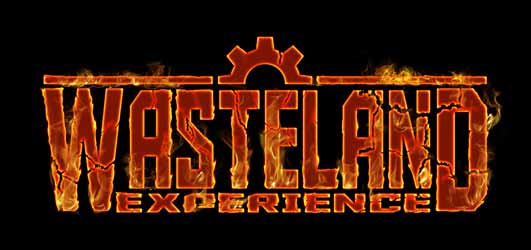|
Click here to return to the main site. Lee Fields - Zed Events (Wasteland Experience)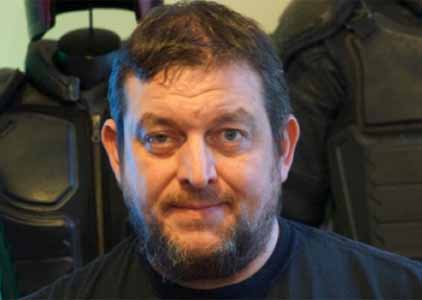 Lee Fields was originally involved in creating the scare attraction Alien War, which opened in Glasgow in 1992 and later relocated to the Trocadero in London. Alien War was the first attraction of its kind that fully immersed thrill seekers into an unfolding storyline based on the iconic 20th Century Fox’s movie Aliens. Fields went on to work within special effects departments for film and TV companies, as well as being a freelance designer/illustrator in the games industry. In 2012, he created Zed Events and opened the worlds first feature length zombie immersive experience which began a whole new niche within the scare industry. Fields closed the Zombie Shopping Mall Experience in early 2018 in order to push the boundaries even further with the new show set in a post apocalyptic near future. Darren Rea spoke with him about the rise of scare attractions and what attendees can expect from Zed Events's Wasteland Experience... Darren Rea: Can you tell us what the Wasteland Experience is all about?
I was part of the very first scare attraction of its type, back in 1992, which was something called Alien War. That started in Glasgow, originally, then went onto Aberdeen and it ended up at the Trocadero Centre in London in the mid-'90s. From that background I went into special effects, making costumes, props, special effect and designing actual theatre shows and all sorts of stuff. About nine years ago we got this abandoned shopping mall that opened up initially as an air soft venue and as a film location. All we wanted to do was do something like Alien War, but make it feature length. So, as opposed to your 15 minute long walk through, congo line that you get nowadays, Alien War was very much interactive. It was all about being led round by a character and that character was relying on you to make decisions, help open doors and keep an eye out for threats and really engaging with the people who were actually going through it. My first sort of love was horror, in specific zombies. And I grew up loving Mad Max films. I'm very much a child of the '80s so I grew up with that sort of Cold War mentality. During the late '70s / early '80s the media was just filled with post apocalypse themes.
We didn't want to go down that route. We wanted to explore what we could do in a horror genre that hadn't been done before and also create something where you just don't know what's going to happen next because they've got this whole world that they can play in and really create something that is really quite insane [laughs] on a certain level. There is nothing like it because it throws people into a complete immersive state where they don't know what's real or isn't real. I must have been on the Alien War experience about four times in the '90s. And every time I went on it it was a different experience. I interviewed those working on it when I worked at DreamWatch magazine, and they said that they got a huge sense of enjoyment moving things around and trying new things. How does the Wasteland Experience compare? Because you have more staff and more to get through Is it tightly scripted?
You take a scare. And look at which way would it not work [laughs] for certain types of people? And it's our job to ensure that that scare works, but doesn't get broken. We add layers of misdirection to almost overload them, so that when we hit them with the big scare, they're broken down psychologically and their brain is ready to soak up what's actually happening in front of them. That's what's great about what we do. We use our crew, as opposed to writing a big long winded script and handing it to them, saying: "Here! Do this!". The creativity flows out of giving people a framework with the dos and don'ts and base information. The main plot devices are there, but these are the guys that come up with the ideas that create the characters. They're playing themselves as apposed to acting. The upshot of that is that the performances from the actors and the crew is just so realistic because these guys are putting themselves into the situation rather than trying to play a character that I've come up with in my head with pages of back story. From that, when we were going through rehearsals, the ideas that were coming out helped to expand the storyline as it evolves. Do you ever wonder what is wrong with humanity that people will pay you to scare the crap out them?
It's not really "out there" like science fiction, where an alien race invades the planet. That's one form of disaster movie but it's all very fantastical. It's all very escapism. If you read Max Brooks's The Zombie Survival Guide, I think most people would realise, after the first couple of chapters, that you'd just be dead [laughs]. But again, like fantasy, people like to think: "Oh, I would do this. Or I would do that. Or if it were a zombie movie I would probably die, but probably towards the end." [laughs]. People don't like to think that they'll die within the first five minutes, but most of us would. People carry that into an experience like this. They want to see how they will do and we don't disappoint. We give people their hero moment [laughs]. In the very first test event that we ran for the Zombie experience, everybody died [laughs] at the end. No body survived. Then I realised I'd made a slight error. What I really needed to do was give them a hero moment. At the end, when everyone died, it was very dramatic and everyone loved it but they also had that sad look on their face. Like: "Yeah, I always kind of knew I would die but I don't like the realisation that I've spent £120 to have it confirmed." [Laughs]. How do you safeguard your performers from over enthusiastic members of the public? I remember the guys at Alien War telling me stories about how they'd sometimes have problems. I tell you what. Alien War was a footfall on the street attraction when it started in Scotland. It was about £2.95 to get in and we had all sorts coming in wanting to start trouble. We became very adept at de-escalation, understanding body language [laughs] and understanding the intent of people that you've just met and in two minutes they're going to be in a live experience with you for 15 minutes. You've not spent any time with them. You don't know them and they've spent very little money to get in. We'd have people deliberately coming in to break the event or have a laugh or in some, extreme cases, came in to really just start trouble.
The instances of where we have had to eject people have been extremely rare over the last six years. We've got a zero alcohol policy. It's very clear during the booking process; on the website; the confirmation email you get clearly states: "Do not consume any alcohol whatsoever". We've had the odd stag party turn up and in their words they've had "one or two". [Laughs]. And they don't even get in the building. Do you get many people who think they're up for it, but when push comes to shove they realise they're not as brave as they thought? Yes. All the time [laughs]. As much as we do the safety talk and try and build people up and make them understand what they're getting into, it's one of those fight or flight situations. Because we're hitting so many psychological buttons, we're playing on all the senses at the same time, some people just hit a point where they just go: "I can not carry on with this any more!" [laughs]. For them it's very real. Their subconscious is screaming at them to stop this and to get out of here. Again we've got procedures in place because it happens reasonably regularly. We're happy to escort people out and take them somewhere nice or directly to a local coffee shop. What's the one thing that you've taken from your past jobs that has been the most useful skill doing what you do now?
I remember the rise of laser tag events like Quaser and Lazer Quest and now we have Escape Rooms. Where do you think the future of interactive group experiences will be? Everything's pointing to VR at the moment. A couple of months ago I did a live interview with BBC World Business and just before I went on there was a piece about an Australian company that had created a VR vest and they were showing the "realism" of it. And they asked me: "What do you think about that?" And I said: "Well, that's great. But what we're selling is 'real' reality" [laughs]. VR is going to be massive. I've experienced the technology that's going into VR and you do genuinely feel connected with it. But at the same time, like movies, it tricks you into an emotional response. If you're standing over a chasm you get an immediate response, kind of like a "boo!" scare when someone jumps out at you and goes: "Boo!" But there's only so long that that would carry on until your brain got used to it and, before long, it's like you're playing computer games again. Whereas, if something is real; it's real and in front of you, you're experiencing it and your heart is pumping 100 miles an hour. What you're hearing, seeing and smelling is real. I was chatting to someone recently who is into these Escape Room attractions and he reminded me that when he'd visited me in London in the '90s that I'd taken on the Alien War event. And still, after all this time, the memories from that brought a huge smile to both of our faces...
You get things like the big boyfriend and his girlfriend. They've come along and he's like 6ft 4in and his girlfriend is 5ft 4in and he'll be the one frozen with fear [laughs] while the girlfriend is the one pumping the shotgun, swearing at him: "Come on! We need to move!" [laughs]. I've known lots of ex-servicemen and a group of these guys were a big part of Alien War. They came in and helped us in the training of what you would actually do if you were evacuating a group of civilians. One of the first things you don't do is shout at them, for a start. When you're in a situation where the proverbial has hit the fan, you need to get people on side: "Here's the situation we're in. This is what we need to do to survive. We need your help because there's only one or two of us. We're low on ammunition..." You need to build the story around what we want them to interact with. Can you go on the Wasteland Experience again and have a totally different experience each time?
So you're hitting all these different points at different times. Still getting the same story, unfolding in slightly different ways and in a slightly different order for different groups. It's also constantly evolving. You could go through it next week and then come back in a month or two and it's all changed because we've broken it down into different elements which we can change regularly to create whole new stories. Where currently riding on the back of a post-apocalypse craze at the moment, probably helped greatly by the popularity of The Walking Dead. When people tire of that what do you think you'll be doing in, say, five years from now? We were the first ones to create this whole zombie experience. When we created it I think we were about three years into The Walking Dead and zombies were just starting to hit the mainstream. I didn't expect to get six years out of it, everyone's quite fickle so I thought maybe we would go for a year or two before we started doing other things. But the truth of the matter is it kept on trundling for six years. Obviously a lot of other providers were coming into the market and there were quite a few that got it right and then there were a few that didn't quite understand it, or were just trying to make more money and they sort of lowered the market expectation, but for six years it became a sub-industry in the scare attraction industry as a whole. Creative wise, I just wanted to move on. It really was just time to go into my next thing.
At the end of the day, everybody loves a good scare. Everybody loves to experience something different, something new. Europe has been at the forefront of the scare industry worldwide. The scare industry originated in America and was driven by the massive Halloween industry over there. Europe, in particular in the theme parks, really started to expand outside of Halloween and started to run things all year round. The first couple of years we did the Zombie experience, half the groups that were coming through were coming from all over the world. In many cases, they'd come across just to do the Zombie experience. They'd spend a weekend in London, of course, but they'd say: "No, No! We've come over to do this. Yes, we'll hang our in London and go catch a theatre show... but, no. We're here to do this because there's nothing like it." [Laughs]. We wanted to come up and do a feature on the Wasteland Experience, but we're too far away and I've been trying to get one of our writers to attend. Most of them are horror fans and love stuff like that, but when push came to shove they all made excuses... basically they admitted that they're too scared. [Laughs] A big part of what we're telling people is "our actors will not touch you. It's all about the perception of threat. So therefore as part of the Health and Safety and trying to mitigate against people getting physical with your crew, so can you please reciprocate that: Please don't touch our actors. We will NEVER touch you." So when you have a situation with a stooge, and somebody is being psychically grabbed away [laughs] people start to question what we said [laughs].
As I said, what we do it's all theatre. It's all about the perception of threat, the perception that something physically will happen to you if you don't run fast enough. All the boundaries are in there... As fast as you can run, the threat will run. How does the event end? Is it like Alien War, where you just smash through the door and your back in the real world? Or do participants get to meet the cast afterwards? Yeah. I won't spoil it. But you get to mingle with the crew. There's a big old truck that's been dressed to fit in with the post-apocalyptic theme. We give them a few minutes to chill out, get some water down their necks, and then we do a photo session with them and their groups and the Wastelanders. All the actors come out, and there's always a big cheer and round of applause, and they come down and the funny thing is [laughs] that they're still in character. So they get there picture taken, but it's not a nice photographic studio environment. Our Wastelanders are still giving them abuse [laughs] and lumbering over them with all the foam hand weapons role play stuff. And They know they're in the real world again, but we're giving them something a bit extra, something of a memento. We post the pictures on our Facebook page and they can get their camera phones out and have selfies with their favourite Wastelander [laughs] and people get to mingle.
What scares you? Ah... My children? [Laughs]. Very little, to be honest. I go to a lot of theme parks. I enjoy scare mazes and scary rides. It's a bit like a busman's holiday situation... If you have a hobby and you work in that hobby it isn't the same again. Because you know all the tricks in the book you're looking at how they're unfolding. You see it in films, when people say: "I know what's going to happen next..." I keep my mouth shut, but in my brain I'm going through the motions. But I do get genuine moments where it just catches you off guard and you think: "That was a good one! That was great!" Do you remember the last time you were caught out? Where they left footed you? Alton Towers hosted ScareCON this year. ScareCON has the industry scare award and it's where all the industry guys get together. They opened up a few of the scare mazes, one was kids and adults which was quite cool and I really enjoyed it. There was one that was a mine and there's a creepy The Hills Have Eyes sort of family that live in this mine, which you've got to go through.
That, for me, wasn't about scares. It was about psychology. Actors just jumping out and going "Raaaaaaarrrrr!" I'm "Cool, thanks. There's people behind me. Jump out at them!" [Laughs]. If money was no object what would you like to do for your next attraction? If money was absolutely no object, I'd create an entire theme park that would explore every avenue, every aspect of horror and psychology. A lot of big theme parks have five or six mazes, and that's what they are they're mazes. Different themes, but still very much mazes. You had combat, gore, proper horror and more psychological horror. There's nothing like walking around and having no idea where you are, that sort of Silent Hill thing, where every door and every window could be a threat. So creating an entire park where you could explore every avenue, and across different genres, would be my thing.
For more information on the Wasteland Experience visit Zed Events: zedevents.co.uk This interview was conducted on 31 May 2018 Return to... |
|---|
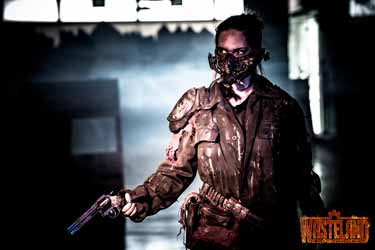 Lee Fields: The Wasteland Experience has its origins in our previous show, which was the Zombie Shopping Mall Experience. Essentially, six years ago [2012] we created the very first feature length, fully interactive zombie survival experience, which was very much movie like, with you being an interactive character in the story. That came from my background working in film and television special effects.
Lee Fields: The Wasteland Experience has its origins in our previous show, which was the Zombie Shopping Mall Experience. Essentially, six years ago [2012] we created the very first feature length, fully interactive zombie survival experience, which was very much movie like, with you being an interactive character in the story. That came from my background working in film and television special effects.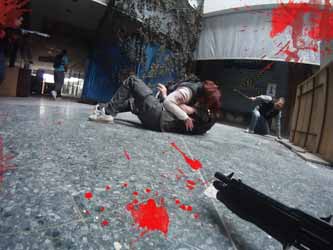 The Zombie Shopping Mall Experience pretty much ran its course over six years. It hit that point where there was very little that we could do with it in terms of expanding on our ideas and introducing new scares. We decided that it was time to move on. Going into the Wasteland Experience it's just given us so much breadth that we're taking advantage of. We're not limited in terms of... zombies are only ever one thing. Things like Resident Evil and various movies and franchises sort of explore mutations and more of the creature aspect of it; taking what zombies originally were intended by George A. Romero, which was a comment on the social, economical and political world of the time. Over the years they've been turned more into scare creatures.
The Zombie Shopping Mall Experience pretty much ran its course over six years. It hit that point where there was very little that we could do with it in terms of expanding on our ideas and introducing new scares. We decided that it was time to move on. Going into the Wasteland Experience it's just given us so much breadth that we're taking advantage of. We're not limited in terms of... zombies are only ever one thing. Things like Resident Evil and various movies and franchises sort of explore mutations and more of the creature aspect of it; taking what zombies originally were intended by George A. Romero, which was a comment on the social, economical and political world of the time. Over the years they've been turned more into scare creatures. 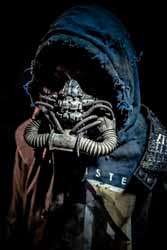 No. I came up with a base story and I know what would logistically have to happen in order to round that story out. You could write a script or screenplay and have to follow a series of parameters in order for it to work in that format. Obviously, in the real world, things are a bit different. You've got to battle through people's misconceptions, you've got to break through their psyche. Not all the plot devices that work in other media transfer into real life, because people are experiencing it for real, they're running around using their own eyes and ears and it's all being steered by an adept writer or visual special effects. For years we've got very adept at taking base ideas and storylines and putting them into something that would logistically function. Then it's down to all my crew, who are just fantastic at this stuff. They understand the dos and the don'ts. They understand the psychological triggers. All my crew work with me to create this world.
No. I came up with a base story and I know what would logistically have to happen in order to round that story out. You could write a script or screenplay and have to follow a series of parameters in order for it to work in that format. Obviously, in the real world, things are a bit different. You've got to battle through people's misconceptions, you've got to break through their psyche. Not all the plot devices that work in other media transfer into real life, because people are experiencing it for real, they're running around using their own eyes and ears and it's all being steered by an adept writer or visual special effects. For years we've got very adept at taking base ideas and storylines and putting them into something that would logistically function. Then it's down to all my crew, who are just fantastic at this stuff. They understand the dos and the don'ts. They understand the psychological triggers. All my crew work with me to create this world.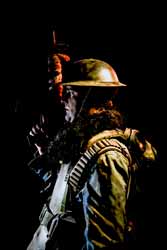 The funny thing is... there are two elements here. People love a good disaster movie. They have a fascination with what would happen if the world went horribly wrong. There's that classic phrase that goes with zombie culture, which is: "What's your plan?" Post Apocalypse is one of those genres where you can genuinely think: "What would I do? I how would I interact with that world? How would I survive?"
The funny thing is... there are two elements here. People love a good disaster movie. They have a fascination with what would happen if the world went horribly wrong. There's that classic phrase that goes with zombie culture, which is: "What's your plan?" Post Apocalypse is one of those genres where you can genuinely think: "What would I do? I how would I interact with that world? How would I survive?" 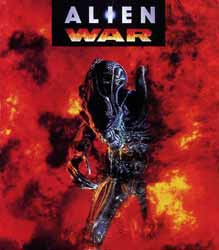 What's very different about how we do things now... obviously the price barrier. It's quite a high price barrier. Our terms and conditions are very clear before you book in. If you don't follow acceptable behaviour you can be ejected from the experience right away. There's a Health and Safety briefing that happens inside the building. That's also to give us a bit of a barrier before we even enter the building. The Health and Safety guys are trained in terms of security and they've got experience of looking at body language and relaying information to them and see how they react to that. Then they go into the building and there's a whole series of other things including extra Health and Safety, about the building, weapons training. So even before they've actually started the experience, we've had them for 40 minutes. So you know we've sussed them out. And you know that in no uncertain terms if you go in there and you muck around it's your money you're wasting, because you will be ejected. We won't allow you to put any of the customers or staff at risk.
What's very different about how we do things now... obviously the price barrier. It's quite a high price barrier. Our terms and conditions are very clear before you book in. If you don't follow acceptable behaviour you can be ejected from the experience right away. There's a Health and Safety briefing that happens inside the building. That's also to give us a bit of a barrier before we even enter the building. The Health and Safety guys are trained in terms of security and they've got experience of looking at body language and relaying information to them and see how they react to that. Then they go into the building and there's a whole series of other things including extra Health and Safety, about the building, weapons training. So even before they've actually started the experience, we've had them for 40 minutes. So you know we've sussed them out. And you know that in no uncertain terms if you go in there and you muck around it's your money you're wasting, because you will be ejected. We won't allow you to put any of the customers or staff at risk.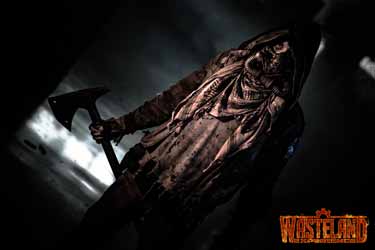 It's people. Understanding psychology. Through working in fantasy land - film / television - you understand a certain amount of psychology. But it isn't until you are psychically trying to manage people and create a world for them, you begin to understand more about psychology. In many cases unwittingly than what you might learn reading text books at university [laughs]. Essentially working in the fantasy world and bringing the fantasy world into the real world and blurring those lines. That's the most that I've taken out of working in those previous industries.
It's people. Understanding psychology. Through working in fantasy land - film / television - you understand a certain amount of psychology. But it isn't until you are psychically trying to manage people and create a world for them, you begin to understand more about psychology. In many cases unwittingly than what you might learn reading text books at university [laughs]. Essentially working in the fantasy world and bringing the fantasy world into the real world and blurring those lines. That's the most that I've taken out of working in those previous industries.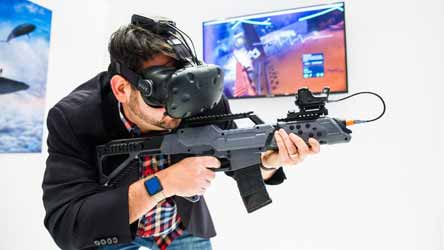 When you witness different types of people in different groups going through a real, proper live experience, where the provider knows what they're doing, that's where you get to see true people. It's a funny thing, as adults we get to play computer games, football, we get to play with our kids... but as adults we very rarely actually get to properly play. And that is: forget about the outside world, completely. You're just in that moment and we are controlling everything you see, hear, smell and experience. In the past we've had big groups of burly doormen come down. All tattooed, muscled and all bragging about how they're going to shoot zombies in the face (although in the old even it was BB guns and we didn't allow that because [laughs] zombies are people too). We had them all the way through and I was like: "Okay, they're gonna behave, that's excellent." WIthin 20 minutes they're running and screaming like girls [laughs] All of the bravado went out the window because we just hit them with so much at the start of the event. It really is like the end of the world has just happened and you're running and screaming and evading... You're in our world now. Now we're going to start playing with you for the next two hours [laughs].
When you witness different types of people in different groups going through a real, proper live experience, where the provider knows what they're doing, that's where you get to see true people. It's a funny thing, as adults we get to play computer games, football, we get to play with our kids... but as adults we very rarely actually get to properly play. And that is: forget about the outside world, completely. You're just in that moment and we are controlling everything you see, hear, smell and experience. In the past we've had big groups of burly doormen come down. All tattooed, muscled and all bragging about how they're going to shoot zombies in the face (although in the old even it was BB guns and we didn't allow that because [laughs] zombies are people too). We had them all the way through and I was like: "Okay, they're gonna behave, that's excellent." WIthin 20 minutes they're running and screaming like girls [laughs] All of the bravado went out the window because we just hit them with so much at the start of the event. It really is like the end of the world has just happened and you're running and screaming and evading... You're in our world now. Now we're going to start playing with you for the next two hours [laughs].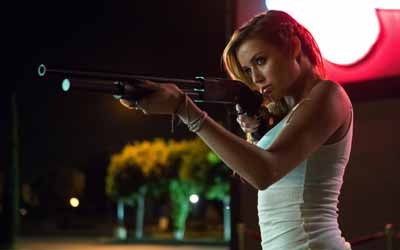 Yeah, and the Zombie experience was the same. The way they've set up the Wasteland Experience is unique. Unlike with Alien War and our previous Zombie experiences, we have an underlying story but you're split up into various groups. So, with the iCOMBAT system we've got it's like firing a real weapon. It's got muzzle flash, real recoil, real sounds, the magazines change in exactly the same was as the real weapon, you've got limited ammunition. At the front end of the gun is a laser based system. That has enabled to have different teams which means we can have the story elements spread throughout the building and the various groups are battling not only amongst themselves, as the story unfolds, but they're battling the bad guys as well and some really nasty stuff as well.
Yeah, and the Zombie experience was the same. The way they've set up the Wasteland Experience is unique. Unlike with Alien War and our previous Zombie experiences, we have an underlying story but you're split up into various groups. So, with the iCOMBAT system we've got it's like firing a real weapon. It's got muzzle flash, real recoil, real sounds, the magazines change in exactly the same was as the real weapon, you've got limited ammunition. At the front end of the gun is a laser based system. That has enabled to have different teams which means we can have the story elements spread throughout the building and the various groups are battling not only amongst themselves, as the story unfolds, but they're battling the bad guys as well and some really nasty stuff as well.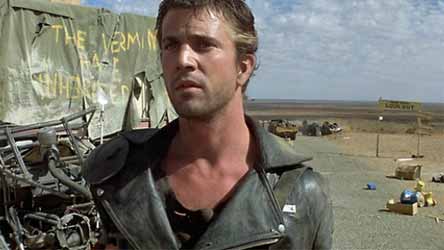 So, moving on from the Wasteland Experience... I always knew I wanted to do a Mad Max style event. It's kind of interesting, the world, we've gone back into the 1980s [laughs]. We've got a new Cold War, tensions around the world have just gone through the roof. Destabilisation... we are heading back to the world of the 1980s. Mad Max, Romero and a whole host of other post-apocalypse films.
So, moving on from the Wasteland Experience... I always knew I wanted to do a Mad Max style event. It's kind of interesting, the world, we've gone back into the 1980s [laughs]. We've got a new Cold War, tensions around the world have just gone through the roof. Destabilisation... we are heading back to the world of the 1980s. Mad Max, Romero and a whole host of other post-apocalypse films.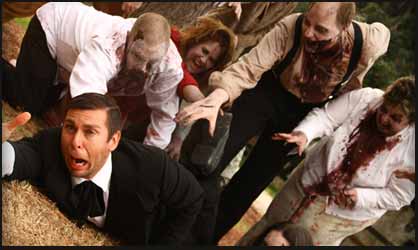 We've done that in the past with various gags and stooges which make it look like people in the group are getting grabbed. They're all plants. They're all people that we've put in. We've had someone join the group on the outside, strike up a relationship while were waiting for Health and Safety and they've said they're on their own because their partner couldn't make it and they've been befriended by a couple who've said: "Why don't you come with us." And later on, when they're getting dragged off somewhere... My goodness, do people get upset. Because they've latched on and formed a bond with that person. It's very much like The Walking Dead, you get attached to a character and they're always killing them off [laughs]. It's not just what you see, hear and smell, you've actually become emotionally attached to a character and when that character is taken off it really does bring out some real base emotions.
We've done that in the past with various gags and stooges which make it look like people in the group are getting grabbed. They're all plants. They're all people that we've put in. We've had someone join the group on the outside, strike up a relationship while were waiting for Health and Safety and they've said they're on their own because their partner couldn't make it and they've been befriended by a couple who've said: "Why don't you come with us." And later on, when they're getting dragged off somewhere... My goodness, do people get upset. Because they've latched on and formed a bond with that person. It's very much like The Walking Dead, you get attached to a character and they're always killing them off [laughs]. It's not just what you see, hear and smell, you've actually become emotionally attached to a character and when that character is taken off it really does bring out some real base emotions.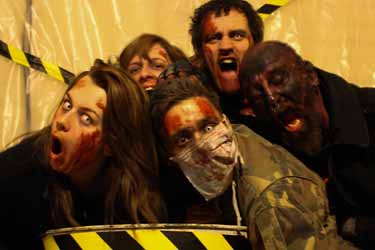 We have groups of people who come to events repeatedly who are all individual, or little groups of two or three or individual people who travel around the country now doing these experiences together. They've formed such a close bond through the experiences that it carries over into the real world with them swapping Facebook and email details and they turn up at our events with their survival mates [laughs]. Repeatedly! We've had some groups come through and every three to four months they come to visit us again. It really is something. It speaks volumes. People come out at the end of it and want to engage with the person next to them to find out what they thought, or actually just slag them off, because they were particularly poor at one point [laughs]. Everyone comes out with these stories.
We have groups of people who come to events repeatedly who are all individual, or little groups of two or three or individual people who travel around the country now doing these experiences together. They've formed such a close bond through the experiences that it carries over into the real world with them swapping Facebook and email details and they turn up at our events with their survival mates [laughs]. Repeatedly! We've had some groups come through and every three to four months they come to visit us again. It really is something. It speaks volumes. People come out at the end of it and want to engage with the person next to them to find out what they thought, or actually just slag them off, because they were particularly poor at one point [laughs]. Everyone comes out with these stories.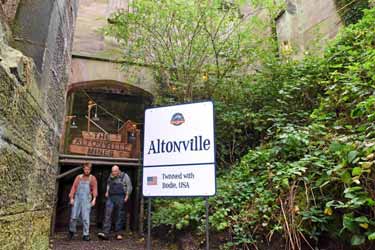 They did things slightly different. This is what you get with the big German parks, where they love getting physically touched and prodded and people getting really close. Under the wrong circumstances that can be a bad thing because you don't know how people will react. The one at Alton Towers [Altonville Mine Tours] was really interesting. You're not running around, you sort of go from bit to bit experiencing everything in slow time. There are a few "boo!" scares as you go through just to keep your adrenaline up a bit, but it is super creepy. The actors didn't just jump out and scare you, they were genuinely creepy... and they touched you! I had a middle-aged man, in his pants, and he's standing there rubbing both your earlobes, in his pants, in the dark [laughs]... and not being threatening... it just weirds you out... That one really got me.
They did things slightly different. This is what you get with the big German parks, where they love getting physically touched and prodded and people getting really close. Under the wrong circumstances that can be a bad thing because you don't know how people will react. The one at Alton Towers [Altonville Mine Tours] was really interesting. You're not running around, you sort of go from bit to bit experiencing everything in slow time. There are a few "boo!" scares as you go through just to keep your adrenaline up a bit, but it is super creepy. The actors didn't just jump out and scare you, they were genuinely creepy... and they touched you! I had a middle-aged man, in his pants, and he's standing there rubbing both your earlobes, in his pants, in the dark [laughs]... and not being threatening... it just weirds you out... That one really got me.